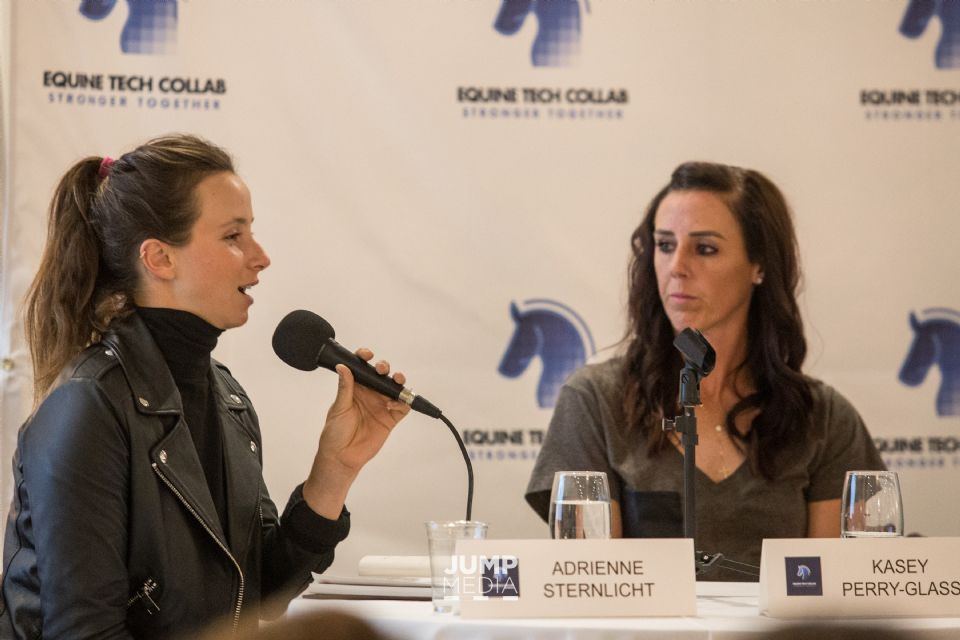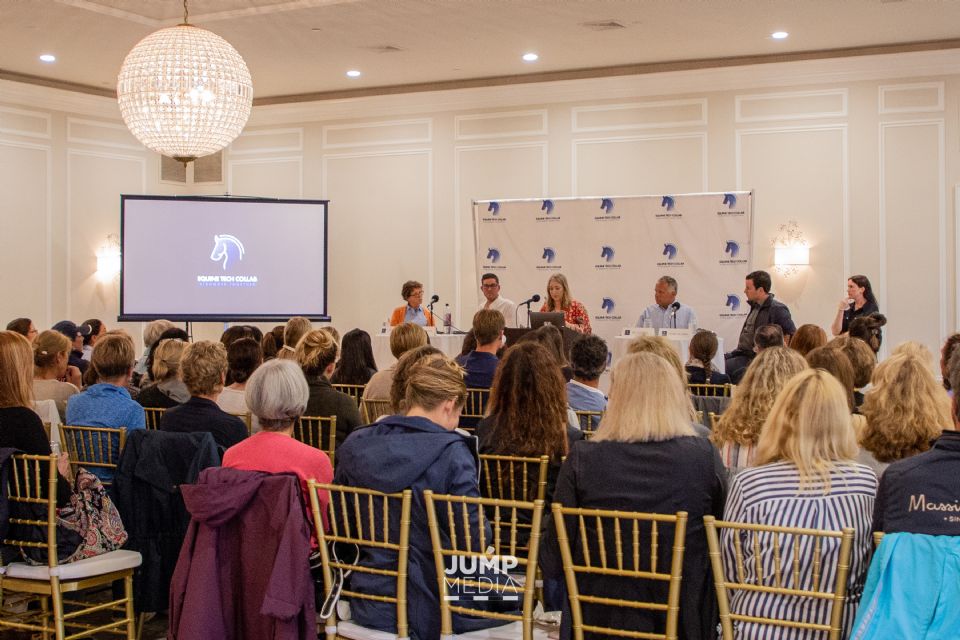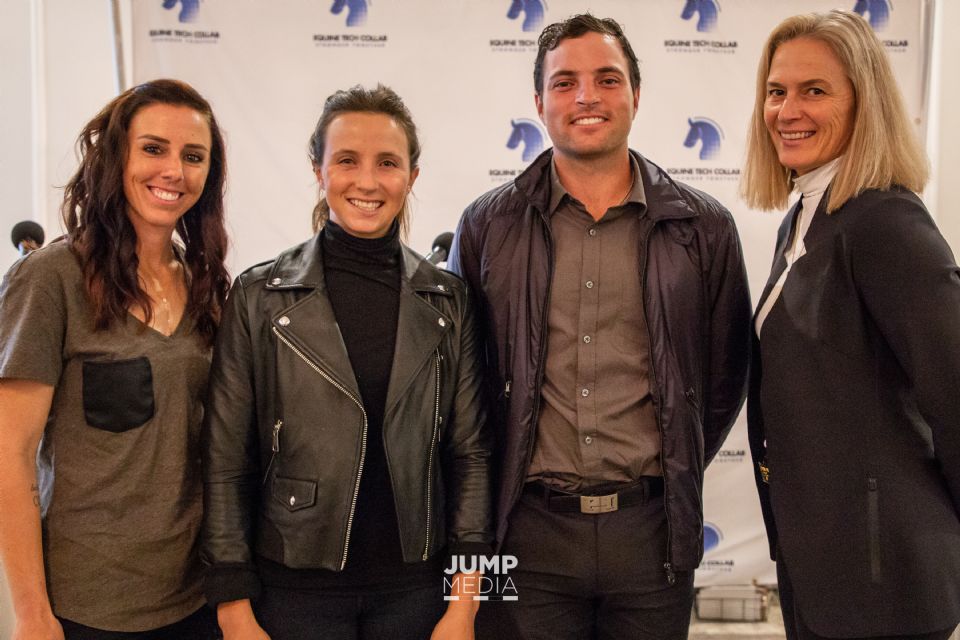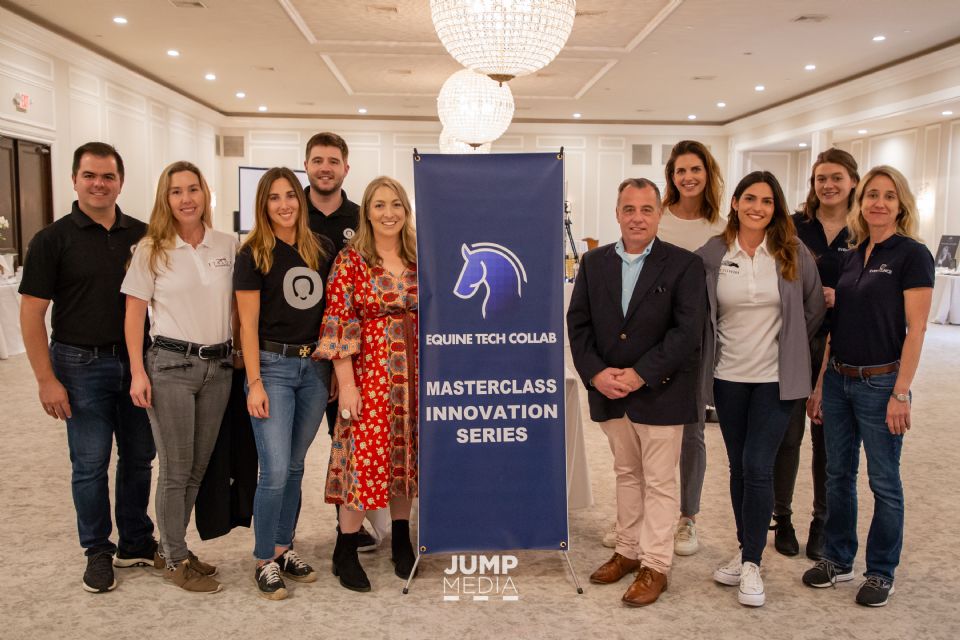Equine Tech Collab Hosts Inaugural Masterclass Focused on a Mindful Approach to Soundness and Mental Strength
March 23, 2019 - Wellington, FL
Adrienne Sternlicht and Kasey Perry-Glass.
Photo by Jump Media
Photo by Jump Media
The first-time event was well received by attendees at The Wanderers Club on Tuesday, March 19.
Photo by Jump Media
Photo by Jump Media
Panelists for In Good Company: Top Riders Discuss the Skills and Practices That Help Them with Mental and Emotional Challenges: Kasey Perry-Glass, Adrienne Sternlicht, and Daniel Bluman, with moderator Tonya Johnston, MA.
Photo by Jump Media
Photo by Jump Media
Panelists for The Soundness Spectrum: Maintaining Horses Soundness Through Proactive Management: Danny Ingratta, Dr. Sheila Schils, Daniel Bluman, and Dr. Tim Ober.
Photo by Jump Media
Photo by Jump Media
The founding members and partners of the Equine Tech Collab, including (from left to right): Juan Palacio of Equo, Christa Lafayette of Etalon Diagnostics, Daniela Cordero and Jacob Schueller of Equo, Nicole Lakin of BarnManager, Rob Jordan of Electronic Vet, Alicia Heiniger of Jumpfax, Alexa Anthony of Stableguard, and Natasha Sprengers-Levine and Tara Swersie of Event Clinics.
Photo by Jump Media
Photo by Jump Media
Attendees at the first event of the Masterclass Innovation Series heard from top riders and industry-leading experts on the topic of “A Mindful Approach to Horse and Rider” in the well-received inaugural event of the series, held on March 19 at The Wanderers Club in Wellington, FL, and hosted by the Equine Tech Collaborative.
The dual panel-format event featured discussions on “The Soundness Spectrum: Maintaining Horses' Soundness Through Proactive Management” and “In Good Company: Top Riders Discuss the Skills and Practices That Help Them with Mental and Emotional Challenges.”
The Masterclass Innovation Series event concept was developed by the Equine Tech Collaborative, a group formed to provide equestrians with the best possible tech solutions and currently includes equine tech companies BarnManager, Electronic Vet, Epona Exchange, Etalon Diagnostics, Equo, Event Clinics, Jumpfax, and StableGuard.
In the opening panel, moderated by Jennifer Wood of Jump Media and Jennifer Wood Media, Dr. Tim Ober, DVM; Dr. Sheila Schils, Ph.D. M.S.; FEI show jumping groom Danny Ingratta, and Olympic and World Championship show jumper Daniel Bluman spoke on topics including assessing a horse for soundness, defining and maintaining soundness, the impact of stress on horses, and steps you can take to immediately improve your own horses’ soundness – including improving your own education.
“Familiarizing yourself with anatomy enough to run your hand down the legs and know where that swelling is and know that it’s different from one day to the next [is one of the first things you can do to improve soundness],” explained Ober, the official veterinarian of the U.S. Equestrian show jumping team. “Most of us vets appreciate clients who have gone through the process to form an opinion in that manner. Focus on your own education; get what you can from each example.”
In addition to Ober’s veterinary perspective, Schils, an innovator in the field of equine rehabilitation and injury prevention, was able to provide insight and practical advice on many of the topics, including the impact of stress on horses from a molecular or biomechanical perspective.
“Stress to muscle is necessary for that muscle to rebuild,” explained Schils, a professor in the pre-vet program at the University of Wisconsin for more than 20 years. “The only way that you’ll get a stronger muscle is to break down muscle fibers. Often what we see in our horses is they get done with a competition, and we feel their backs and immediately feel, ‘Oh they’re sore.’ In my world, as long as that soreness doesn’t become pathological, I’m in the back going, ‘Yay!’ Because now, next week that horse is going to become stronger.
“We don’t want to over-stress those muscles, but we have to look at this discomfort and pain in a different way,” continued Schils. “The way that we reduce this stress, so it ends up making a stronger muscle as an outcome rather than resulting in injury, is we use the muscle more. The worst thing after the muscle has been stressed is to let it sit in the stall and rest, because then it becomes inflamed. If I have my preference, you ride them, because you have such a good sense of when that horse becomes fatigued. If a horse as had a strenuous week, and then you put them on a treadmill, or especially a water treadmill, then you could be not giving them that appropriate recovery time.”
When it comes to planning what is the appropriate recovery time and what exercise is best for each horse, Ingratta, the head groom for Millar Brooke Farm (home of 10-time Canadian Olympian Ian Millar), and two-time Olympic show jumper Bluman were able to provide insight into their own programs and advice for what may work well for others.
“In our program, we have these lovely weekly sheets that we have come up with,” explained Ingratta, who studied animal biology at the University of Guelph. “We have written down that they’re going to jump today; they’re going to treadmill; they’re going to ride; we have exactly what they’re going to do, more or less, throughout the week.”
The same sort of daily plan and clear schedule is used by Bluman. “I think it’s very important to have a plan. Through the years, I’ve learned that from better professionals,” said the three-time World Equestrian Games (WEG) contender who represents Israel. “In our organization, we know pretty much for the month, per day, what each horse is going to do. It’s definitely very important to have a good plan, to keep the horses fresh, and to know when it’s time to say cancel that show or the horse is not fit enough. With the routine being so precise, it makes it easier for me to notice if there are differences.”
At the end of the day, the decisions of managing each horse’s schedule comes back to the same concept advised by Ober: improving your own education. And for Ingratta and Bluman, they find that that comes best through time spent with and getting to know their horses.
“For me it’s daily; every day I’m looking at the horse,” said Ingratta. “I’m feeling the horse…Everything from acupuncture points to if their legs are a little bit bigger. We create a program to help the horse.”
Bluman added, “You just have to do it a lot with feeling, and your feeling gets better with time. The more experiences that you have with different horses, the more that you learn what to do and what not to do. Be organized, and then just judge what your feeling tells you. It’s all about spending many hours with the horses so that you have as much information as you can.”
The Mental Aspect
The second session of the evening, featuring Bluman, Kasey Perry-Glass, Adrienne Sternlicht, and moderator Tonya Johnston, MA, discussed the practices that riders use to handle mental and emotional challenges including maintaining confidence, handling mistakes, developing routines, staying present, and more.
“Before a big class, I have a very distinct routine,” said Sternlicht, who claimed team gold at the 2018 WEG with the U.S. show jumping team. “All that routine does is bring comfort to uncomfortable situations. I was so freaked out the first day at the [WEG]! I had no idea what to expect. I found comfort in being able to a) meditate and b) listen to books. There are certain chapters of certain books that I listen to that I really, really like.
“Mental health, I think of it like a pendulum, so I’m constantly trying to bring myself back to a place that I know works for me,” said Sternlicht, who often listens to two chapters of Letting Go: The Pathway of Surrender by David R. Hawkins, M.D., Ph.D, as part of her pre-competition routine.
Bluman and Perry-Glass, a U.S. Dressage Olympic team bronze medalist and a WEG team silver medalist currently ranked fifth in the world on the FEI Dressage World Rankings, also shared the routines that they have developed over the years and emphasized the importance that they have found in developing and keeping these habits.
“For me, personally, I just try to focus on the reasons why I do the sport,” continued Bluman. “I didn’t start riding because I wanted to win a five-star grand prix anywhere in the world. I didn’t even know that five-star grand prix existed. I really just started riding because I loved horses. In times when I’m really anxious or I feel my head is getting ahead of me, I just really try to remember that thankfully we work with horses and not with motorcycles or with cars. We work with actual animals that have this incredible power to give us that feeling of calm or peace.”
All three riders place high importance on mental health, and Bluman and Perry-Glass both spoke of the benefits that they have found in working with sports psychologists.
“I had a traumatic experience leading up to the Rio Olympics. My horse got overfloated with his teeth. He wouldn’t eat; it was just horrible,” said Perry-Glass, who had quickly shot up into the high-performance dressage world and felt that she soon found herself mentally under-prepared to handle those sort of traumatic experiences alongside the high level of competition. “After Rio I went through a pretty big depression through the season of 2017; at the end of 2017 I took a big break and started talking to a sports psychologist, just getting my mind right again.
“I think it’s really important to be mentally strong,” continued Perry-Glass. “Just because you’re emotionally strong doesn’t mean you don’t have feelings. I think it’s important to stay true to yourself and take care of yourself and your mind.”
“It’s a constant battle,” added Bluman. “To say that after the competition I’m not angry if I had a rail down, that would be a total lie. If I keep dwelling on it, then I start affecting other people. It’s important to bounce back from it. Even if you have to fake it, fake it, but you cannot dwell for too long. There needs to be a balance between work and sport, especially in our industry where we compete until our 60s. If we’re going to take it that seriously that we’re going to be dwelling from the time that we lost until the time that we win, we’re going to spend most of the year dwelling!”
The Masterclass Innovation Series was designed to embody the Equine Tech Collab’s mission of supporting the education of equestrians in order to equip them with the knowledge and tools needed to facilitate the best practices in horse care, welfare, and management.
“We formed the Equine Tech Collab with the idea that we are ‘stronger together,’ and that’s become our tagline,” said Nicole Lakin, the founder and CEO of barn management software BarnManager. “Together we’re able to reach more people, providing them with technology solutions and education through events like this that would not be possible on our own as individual companies.”
Together as a group, the Equine Tech Collab was also able to raise funds for the USEF Equine Disaster Relief Fund, with all proceeds from the Masterclass Innovation Series going to support the non-profit effort.
To learn more about the Equine Tech Collab, visit www.EquineTechCollab.com.
For media interested in transcripts, quotes, or unique editorial coverage of the Masterclass Innovation Series, please contact Emily at emily@jumpmediallc.com.
About the Equine Tech Collaborative
The Equine Tech Collaborative was formed in 2017 by founding companies BarnManager, Equo, Jumpfax, and StableGuard. Each of the founders was looking for ways to continue to develop their offerings to ensure that they were providing the best possible solutions for those within the equestrian industry.
Through conversation, collaboration, and coordination, these four founders created a group to share experiences and work together toward shared goals for the betterment of the lives of equestrians everywhere. Today, the Equine Tech Collab has grown and continues to be strengthened by the innovation that occurs when you bring people from different backgrounds and areas of expertise together and through the addition of new partners including Electronic Vet, Epona Exchange, Etalon Diagnostics, and Event Clinics. Learn more about the Equine Tech Collaborative at www.equinetechcollab.com.







